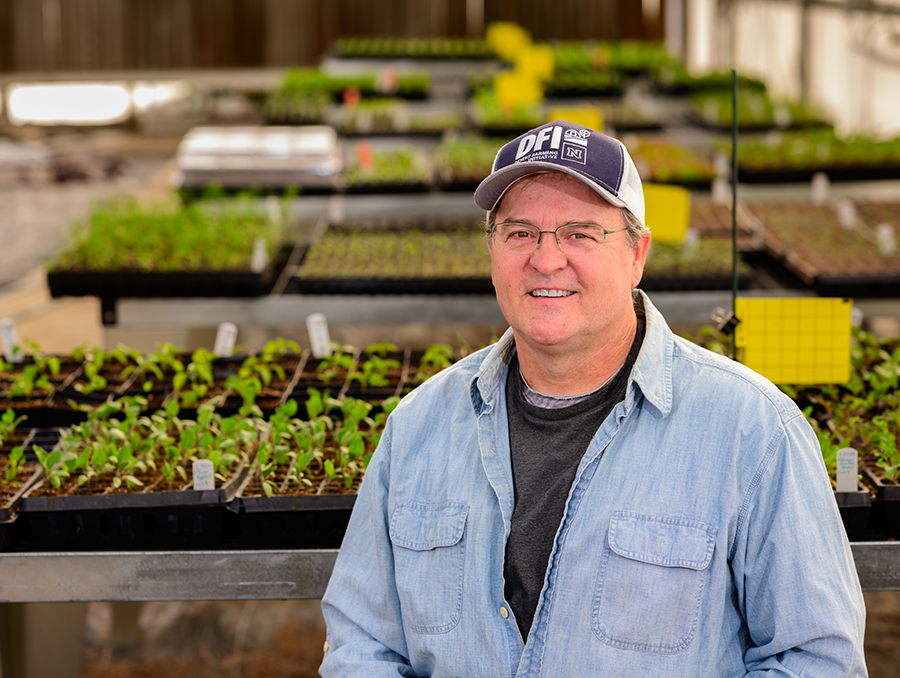Nevada
University launches program to increase number of Nevada organic producers | University of Nevada, Reno

Consumers are increasingly seeking organic food, whether it’s at their local grocery store, corner café or favorite restaurant. As the demand for organic produce by consumers, grocery outlets and restaurants continue to rise, a new program will help guide Nevada producers through the process to become certified organic producers. The University of Nevada, Reno’s Desert Farming Initiative has launched the “Grow Organic Nevada” Program that will enlist the help of producers who are already certified organic to help mentor other producers seeking to become certified organic.
“You get a plan written and use it. It’s not as hard as people want to make it,” said Rob Holley, who owns and operates his own certified organic farm in Dayton, Nevada, and will coordinate the program. “The organic system plan requires recordkeeping, but it’s just a documented extension of what that farmer or rancher is already doing. They are farther along than they think. There’s a lot of resources out there, and then the mentors can help streamline that process for those who are interested.”
Holley’s family has been farming in Dayton for more than 50 years. When Holley decided to seek organic certification for Holley Family Farms in 2011, he said he worked very closely with a couple of other producers and the Nevada Department of Agriculture who helped them through the process. He says it’s been worth it.
“Since becoming organic in 2011, we’ve seen a continued increase in sales and demand for our product,” he said.
Indeed, organic has gone mainstream. According to the USDA, conventional grocery retailers have overtaken natural food stores as the most popular outlet for organic food, with 55.6% of sales in 2021. And, certified organic U.S. land for growing crops or livestock increased from 1.8 million acres in 2000 to 4.9 million acres in 2021. But, in Nevada, there are only 37 certified organic producers, and only 12 of those grow what we typically consider to be produce (vegetables, fruit, nuts, etc.), while 22 grow hay/grain/forage for livestock, and three raise livestock for meat production.
To encourage producers to take the plunge into organic, the new program is providing $500 to producers seeking to become certified organic and accepted into the program. Those seeking a mentor can request a mentor online.
To encourage producers who are already certified organic to serve as mentors, mentors receive $3,000 for 40 hours of service, providing one-on-one guidance through the process and sharing their organic farming expertise, as well as participating in regional organic-focused community events. Mentors can earn more for mentoring multiple transitioning producers and are also provided with supplemental training in interpersonal skills and organic practices. Those interested in becoming a mentor should have at least three years of direct experience managing organic production and certification, as well as a strong understanding of the process to become certified organic. Producers interested in mentoring, also apply to become a mentor online.
The funding stipends for producers and other program costs is being provided through grant funds of over $500,000 through the United States Department of Agriculture (USDA) Transition to Organic Partnership Program, a network assembled by the USDA’s National Organic Program to support transitioning and organic producers with mentorship and resources. There are six designated regions for the program, and Nevada falls under the West/Southwest Region, which is led by the nonprofit California Certified Organic Farmers. The nonprofit organization has contracted the University to run the program in Nevada.
Jill Moe, director of the Desert Farming Initiative, which is a program of the University’s Experiment Station unit in the College of Agriculture, Biotechnology and Natural Resources, said that when she learned of the Transition to Organic Partnership Program, she immediately saw it as a perfect fit for the Initiative and its goals to support local producers, advance climate-smart farming practices and promote food security in the state. She said that Holley, with his longtime farming experience and other professional experience, is also an excellent fit to lead the program.
“Rob is graduate of the University and has worked with us on projects as a successful producer for decades,” she said. “But, besides that, he has more than 30 years of management experience and professional positions working for state and local partner agencies with goals that align with the goals of our College.”
Holley has served as district manager at the Dayton Valley Conservation District, park ranger at the Nevada Division of State Parks, and forester in Elko at the Nevada Division of Forestry. He says he’s excited to get the new program off the ground.
“I’m already receiving requests to get involved, from both mentors and mentees,” he said. “But, I really want to reach out to those producers who are underserved or not necessarily already in the loop, and to the tribal communities as well,” he said. “There’s a pretty broad net to cast across our state, and I intend to reach both small and large producers, in every corner of our state.”
For more information on the Grow Organic Nevada Program, contact Holley at 775-784-6556.
Grow Organic Nevada is supported through the United States Department of Agriculture (USDA) Transition to Organic Partnership Program, which is a program of the USDA Organic Transition Initiative and is administered by the USDA Agricultural Marketing Service National Organic Program.

Nevada
RFK Jr. meets signature requirements to appear on Nevada ballot

Robert F. Kennedy’s presidential campaign submitted the required number of valid signatures in order to appear on Nevada’s ballot in November, the secretary of state’s office confirmed Friday.
Kennedy’s campaign in Nevada submitted more than 22,000 valid signatures to county clerks in early July in order to qualify as an independent presidential candidate.
In a notice sent Friday, the secretary of state’s office said that based on the examination conducted by county election officials, the office determined that the total number of signatures exceeds the number of valid signatures necessary to declare the petition for candidacy necessary.
The Kennedy campaign must next submit the names of the six primary and six alternate electors that would certify the election for Kennedy if he were to win.
Notice of Sufficiency of Petition for Robert F. Kennedy Jr. Independent Candidate for United States Preside… by Jessica Hill on Scribd
Contact Jessica Hill at jehill@reviewjournal.com. Follow @jess_hillyeah on X.
Nevada
Planning phase underway for College of Southern Nevada's northwest campus

LAS VEGAS (KTNV) — The development of the College of Southern Nevada’s Northwest campus has taken another step forward after the state allocated $4.5 million for the planning phase, said CSN’s Vice President of Academic Affairs James McCoy.
He showed me the plans that they’ve come up with so far, which includes photos from similar campuses in other parts of the country.
“The blue would be a 60,000 square foot law enforcement academy coupled with some general education and student support services to support those students and others throughout the northwest,” he told me as he pointed to the tentative plans. “It would include the parking as we talk about the land development. You need that. It will include the central plant to operate the campus and the building.”
They’re still deciding on whether an emergency vehicle operations course will be included in phase one.
The reason he calls them potential plans is because the project is based on funding by the state legislature.
“Our goal is to be 100% construction documents in hand by the time the legislative session is wrapping up, so June of 2025,” he said.
Then come the inspections and everything else needed before construction can begin.
As for the cost of the actual construction, it’s yet to be determined.
“Still a work in progress,” said McCoy. “We’ll know much more as the state public works prepares for the presentations of all the capital projects for the entire state. That is slated for Aug.28 and 29.”
By the time it’s all said and done, the first phase has to be shovel ready by June 2026, or else they risk losing the land.
Nevada
Shelter in place ordered in Dayton

RENO, Nev. (KOLO) – The Lyon County Sheriff’s Office is asking people in Dayton to shelter in place as deputies search for an armed suspect.
Specifically those who live in the area of Woodlake/Brookfield/Woodside should use caution.
Deputies are searching the area for a male subject last seen wearing a black shirt and possibly has a large cut on his neck, forehead and wrists. He is reportedly armed with a knife and possibly a danger to himself especially and others.
If you see someone who matches the description, please do not approach or attempt to apprehend the subject, CALL 911.
Copyright 2024 KOLO. All rights reserved.
-

 World1 week ago
World1 week agoOne dead after car crashes into restaurant in Paris
-

 Midwest1 week ago
Midwest1 week agoMichigan rep posts video response to Stephen Colbert's joke about his RNC speech: 'Touché'
-

 News1 week ago
News1 week agoVideo: Young Republicans on Why Their Party Isn’t Reaching Gen Z (And What They Can Do About It)
-

 Movie Reviews1 week ago
Movie Reviews1 week agoMovie Review: A new generation drives into the storm in rousing ‘Twisters’
-

 News1 week ago
News1 week agoIn Milwaukee, Black Voters Struggle to Find a Home With Either Party
-

 Politics1 week ago
Politics1 week agoFox News Politics: The Call is Coming from Inside the House
-

 News1 week ago
News1 week agoVideo: J.D. Vance Accepts Vice-Presidential Nomination
-

 World1 week ago
World1 week agoTrump to take RNC stage for first speech since assassination attempt















